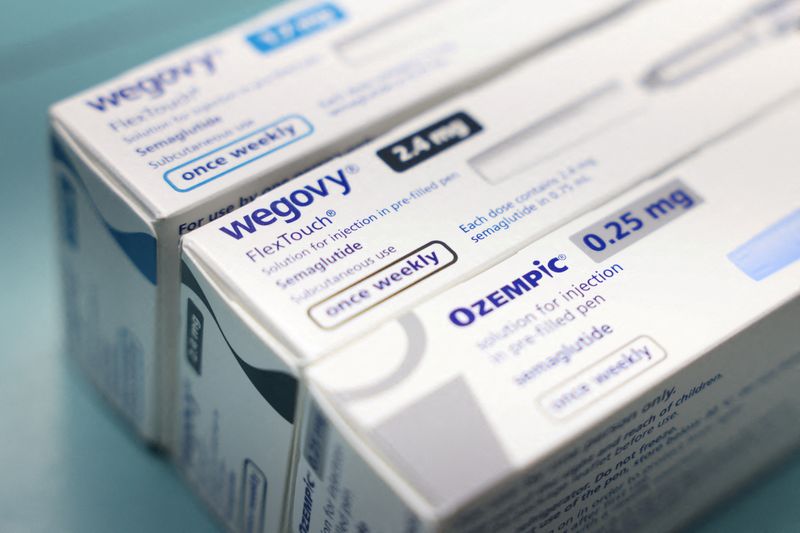Jessica DiNapoli
NEW YORK (Reuters) – A new food brand aimed at people taking weight-loss drugs such as Wegobee will tout its high protein, fibre and nutrients, a Nestle executive told Reuters, but would not reveal the name of the hit drug.
Nestle, the world's largest food maker, is removing pharmaceutical names from its packaging due to regulatory concerns, Tom Moe, president of Nestle USA's food division, said in a recent interview. Instead, the company will promote its Vital Pursuit line of under-$5 frozen meals on social media, he said.
“We're not going to directly state the link (to drugs) on the food packaging,” Moe said.
Nestle's reluctance to put the names of drugs such as Novo Nordisk's Wegovy and Ozempic on its packaging shows the uncertainty facing global food companies betting big on selling products tailored to millions of people who take appetite suppressants.
The drug, which belongs to a class of medications known as GLP-1 agonists, drastically reduces the amount of food people eat, threatening to hit the profits of snack food makers and fast-food chains.
When Nestle's fajita melts and pizzas hit store shelves this fall, the company will face a host of competitors making specific claims about their products that target people undergoing drug treatment.
The makers of BioCare, a drink that sells for $4.50 a pop, touts on the packaging that it can “reduce side effects” such as nausea in people taking Wegobee and semaglutide, the active ingredient in Ozempic.
The drug can cause gastrointestinal side effects, but doctors recommend that users continue to eat foods, especially those rich in protein, to maintain energy and prevent muscle loss.
Herbalife claims that people can get nutrition while taking the injectables, sometimes called “shots,” and markets the shakes, which it sells for $185.10 a pack.
Retailers like supplement distributor GNC are also trying to capitalize on the trend by setting up sections of their stores specifically for GLP-1 users, selling protein powders and fiber.
Nestle could face regulatory scrutiny if it mentions weight-loss drugs on its Vital Pursuit product packaging.
“We're not medicine, we're food,” Moe said.
Food lawyer Lauren Handel said referring to a drug implies that the food somehow treats or prevents disease — a claim that only drugs approved by the Food and Drug Administration can make.
“This is a tricky area where you have to be careful what you say,” Handel said. “The safest course of action is to not say anything about drugs.”
The same rules apply to advertising, she says: Labeling a product as “for dieters” or “medicine companion” might help it comply with FDA regulations. “Some companies are taking more risks,” she says.
Nestle declined to comment on whether it would mention the medicines in its ads.
“An absolute game changer”
Herbalife has taken a more direct approach, stating on Facebook: “Are you using a GLP-1 weight loss drug? Support your nutritional needs with Herbalife's GLP-1 Companion Pack.”
Robard, which makes BioCare, said it was marketing the drink through a “strong and influential community of people taking GLP-1 drugs.” Other drugs in this class include Eli Lilly's Maunjaro and Zepbound.
Ashley Dunham, a BioCare influencer from Jacksonville, Florida, said in a TikTok video that the product has been a “total game changer” in helping her keep the weight off after losing 100 pounds.
Coca-Cola and yogurt maker Danone say many of their products are low in sugar or high in protein, making them ideal for people taking medication.
Coca-Cola's Fairlife shake, which contains up to 42 grams of protein, is frequently promoted by drug-using social media influencers.
Fairlife has no paid partners or influencers linking the shakes to GLP-1 or weight loss, and does not target them with free products or other incentives, the spokesperson said.
Healthy Choice food maker Conagra Brands also plans to remove drug names from the packaging of foods it sells to people taking medications, an executive told Reuters this month.
Megan Block, director of strategic insights at Conagra, said using the name could turn off people who aren't taking medication but are considering buying edibles.
Bob Nolan, Conagra's vice president of demand science, said the company will focus on attributes of existing products, such as protein and fiber content, to help consumers who use GLP-1 know that foods are right for them.
Conagra isn't currently developing new brands aimed at people taking those medications, but company executives said they see an opportunity to sell more frozen meals to this population.
Kelly Frias, a marketing professor at American University, said consumers still don't have a clear idea of what they should eat while taking medication.
Food companies are “trying to create new associations,” she said, “that we don't make until we're taught them.”
(Reporting by Jessica DiNapoli in New York; Editing by Bill Berkrott)



